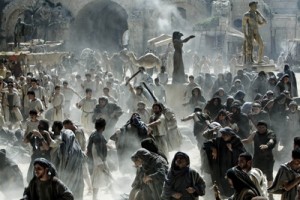
 This excellent film has yet to find a North American distributor. It’s not hard to guess why. The film is a historically accurate portrayal of religious life in Alexandria in the early fifth century AD. The main character is Hypatia, the woman philosopher at the Museum of Alexandria, who was savagely murdered by a Christian mob. The film accurately portrays the city as engulfed in the brutal religious violence that accompanied the rise of Christianity in many parts of the Empire (The population of the city was divided between Christians, Pagans, and Jews, all sensitive to “insults” and determined to use force to control the city). A celebrity female philosopher was an abomination to all the fanatics, and the key to destroying secular authority and such civilized, tolerant practitioners of religion as existed. In these background elements, the film tells the plain, irrefutable historical truth. Naturally, the Catholic and various Protestant churches have denounced the film as “hate”, and launched boycotts, and so on. The invented aspects of the film are legitimate historical fiction — Hypatia is represented as being on the verge of solving some key riddles of the solar system (not entirely implausible), and there’s a subplot about a slave in love with her. Otherwise, the larger political events are well portrayed, and the visual recreation of Alexandria is painstakingly accurate. Far from being propaganda, the film understates key events to avoid sensationalism: the film shows the Christian mob stoning Hypatia, while in fact they ripped her apart alive, stripped all her flesh from her bones with oyster shells, and immolated her. Nor is the film one-sided, as it shows all the religious factions engaging in atrocities. As a heroine, Hypatia is meant to represent Reason, not Paganism.
This excellent film has yet to find a North American distributor. It’s not hard to guess why. The film is a historically accurate portrayal of religious life in Alexandria in the early fifth century AD. The main character is Hypatia, the woman philosopher at the Museum of Alexandria, who was savagely murdered by a Christian mob. The film accurately portrays the city as engulfed in the brutal religious violence that accompanied the rise of Christianity in many parts of the Empire (The population of the city was divided between Christians, Pagans, and Jews, all sensitive to “insults” and determined to use force to control the city). A celebrity female philosopher was an abomination to all the fanatics, and the key to destroying secular authority and such civilized, tolerant practitioners of religion as existed. In these background elements, the film tells the plain, irrefutable historical truth. Naturally, the Catholic and various Protestant churches have denounced the film as “hate”, and launched boycotts, and so on. The invented aspects of the film are legitimate historical fiction — Hypatia is represented as being on the verge of solving some key riddles of the solar system (not entirely implausible), and there’s a subplot about a slave in love with her. Otherwise, the larger political events are well portrayed, and the visual recreation of Alexandria is painstakingly accurate. Far from being propaganda, the film understates key events to avoid sensationalism: the film shows the Christian mob stoning Hypatia, while in fact they ripped her apart alive, stripped all her flesh from her bones with oyster shells, and immolated her. Nor is the film one-sided, as it shows all the religious factions engaging in atrocities. As a heroine, Hypatia is meant to represent Reason, not Paganism.
It is sad, but the current version of the ignorance and fanaticism that led to the destruction of the Great Library of Alexandria will prevent many people in the world from seeing this fine film. It isn’t anything special as pure cinema — following actual historical events, as usual, makes for unsatisfying drama. The film is well-acted, but not dramatically compelling. But as a window into a time and place that the general public in North America knows nothing about, and that the political bosses of their churches don’t want them to know anything about, it is superb.
0 Comments.